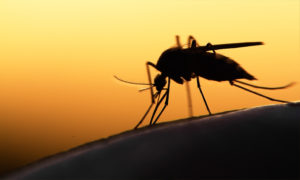 (Lindenwold, NJ) – Early Friday morning the Mosquito Control Commission will be in the community spraying and surveilling areas throughout Camden County. During the fall months the commission schedules on an as-needed basis based upon the results of their surveillance efforts and input from the public.
(Lindenwold, NJ) – Early Friday morning the Mosquito Control Commission will be in the community spraying and surveilling areas throughout Camden County. During the fall months the commission schedules on an as-needed basis based upon the results of their surveillance efforts and input from the public.
“The weather this week has been overcast and wet. Whenever there is precipitation, we should check our yards for standing water. Mosquitos need standing water to breed, so it important to routinely check your yard and remove any standing water to help eliminate the threat,” said Commissioner Jeff Nash, liaison to the Camden County Mosquito Commission. “This simple act can help reduce the pest population in your neighborhood and assist the efforts of the Camden County Mosquito Control Commission.”
The Camden County Mosquito Commission will be conducting ULV “spraying” operations on Thursday, October 28 between the hours of 2am-6am in the following locations, weather permitting:
Winslow Township
Wharton Ave.
Howard Ave.
Wharton State Forest Rd.
Cherry Hill
Lynford Dr.
Hadleigh Dr.
Brondesbury Dr.
Staffordshire Rd.
Brick Rd.
E Partridge Ln.
Kingsdale Ave.
Partridge Ln.
Roland Ct.
Red Oak Dr.
Sequoia Rd.
Teak Ct.
SE Gate Dr.
W Riding Rd.
Laurel Hill Dr.
Indian King Dr.
Hessian Way
Marlkress Rd.
Millhouse Ln.
N Riding Dr.
E Riding Dr.
Leith Hill Dr.
Mews Ln.
Lane of Trees
Barbara Dr.
Winding Dr.
Ann Dr.
Edgewood Dr.
Robin Lake Dr.
Heartwood Dr.
Heron Rd.
Bunker Hill Dr.
Starling Ln.
Crown Point Ln.
Fort Duquesne Dr.
Mayflower Ln.
Plymouth Rock Dr.
Brooklawn
S Wilson Ave.
S Hannevig Ave.
Horton Ave.
N Wilson Ave.
Old Broadway Way
N Hannevig Ave.
Bergen St.
Haakon Rd.
Maude Ave.
Christiana St.
Delaware St.
Community Rd.
Noreg Pl.
“The commission works with the Public Health Environmental Laboratories in Trenton to verify the presence of West Nile Virus and other communicable diseases in their samples,” Nash said. “If a pool tests positive, the Mosquito Commission returns to spray the area. The sprayings take place when the mosquitoes are most active.”
The mosquito spray is not harmful to humans or pets, but you should avoid direct contact if you have respiratory concerns or are sensitive to irritants.
Residents should check their property for any object that holds water for more than a few days. All pre-adult mosquito stages (eggs, larvae, and pupae) must be in stagnant water in order to develop into adult mosquitoes.
- Swimming pools are a common problem. All pools must be checked and maintained to keep them mosquito-free. Swimming pools can breed mosquitoes within days after you stop adding chlorine or other disinfectant. Pool covers can catch rainwater and become a mosquito development site. Add a little chlorine to kill mosquitoes.
- Maintain screens to prevent adult mosquitoes from entering your home or business.
- Personal protection is strongly urged if you are outside when mosquitoes may be active—generally dawn and dusk. Insect repellants containing between 10-35% DEET are very effective, however, be sure to follow the label directions and take extra precautions with children and infants.
The Camden County Mosquito Commission suggests checking around your yard for mosquito breeding containers. The following is a checklist of tips to help eliminate mosquito breeding:
- Dispose of unnecessary containers that hold water. Containers you wish to save turn upside down or put holes in the bottom so all water drains out.
- Lift up flowerpots and dump the water from the dish underneath every week.
- Stock fish or add mosquito larvicide to ornamental ponds.
- Change water in bird baths, fountains, and animal troughs weekly.
- Screen vents to septic and other water tanks.
- Store large boats so they drain and small boats upside down. If covered, keep the tarp tight so water does not pool on top of the tarp.
- Do not dump leaves or grass clippings into a catch basin or streams.
- Do not allow water to collect on sagging tarps or awnings.
- Do not allow trashcan lids to fill with water.
- Check downspouts that are able to hold enough water to allow mosquito larvae to mature.
For more information, or to report a problem, contact the Camden County Mosquito Commission at (856) 566-2945 or skeeters@camdencounty.com.
